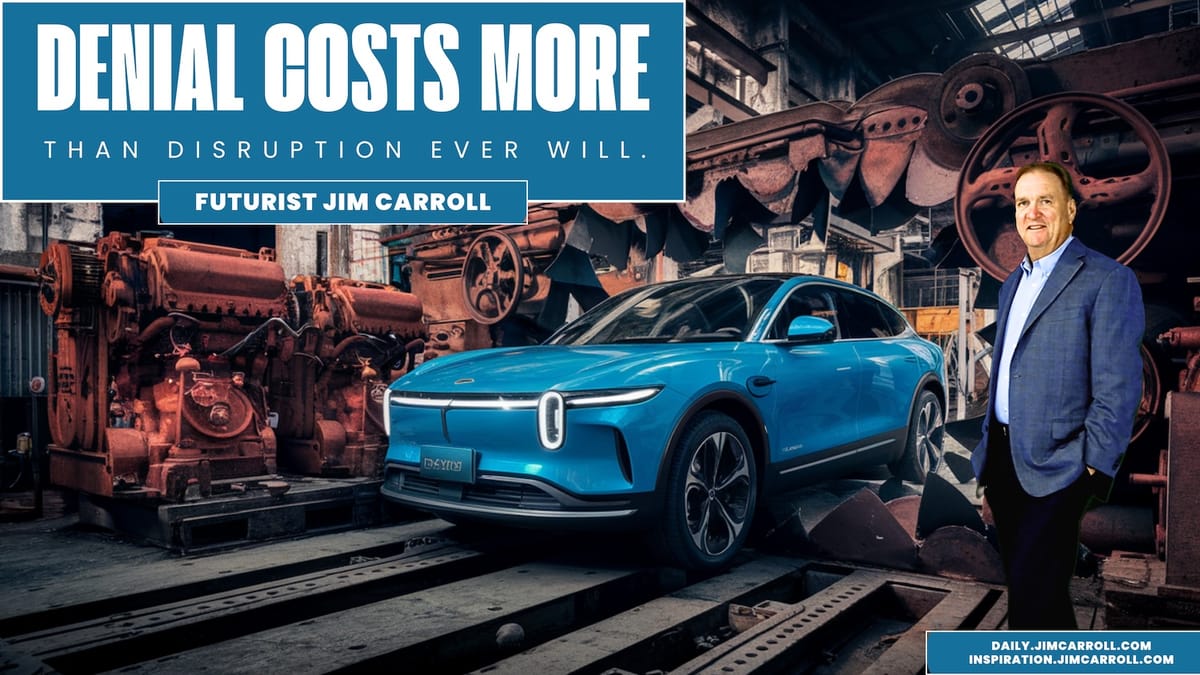"Denial costs more than disruption ever will" - Futurist Jim Carroll
Are we witnessing the end phase of the auto industry's lost battle and the cost of cultural denial?
That might be the case. Watch this short video clip with Ford CEO Jim Farley at the recent DealBook summit.
His comments mirror what I've come to believe over the last few years - it brings me no joy to realize that it's pretty likely that the North American, German, and Japanese automotive industries have lost the battle for the future. I apologize for the bluntness of this assessment, but as a futurist, my role isn't to comfort - it's to confront reality. Given everything that has happened, and where we stand today, it seems to be an uncomfortable truth.
The implications, of course, are staggering.
What makes this loss particularly tragic is that it didn't have to happen. But somewhere along the way, transformative technologies like electric vehicles became casualties of the unprecedented cultural war. We've entered an era where scientific and technological progress has become entangled with identity politics, where choosing an electric vehicle isn't seen as an economic or environmental decision, but as a cultural statement. The same phenomenon has infected attitudes toward renewable energy, genomic science, and other breakthrough technologies that should represent economic opportunity rather than ideological battlegrounds.
I've posted about this before here, but the real implications are becoming more clear day by day.
The cost of this cultural warfare against the future isn't just measured in polar ice or parts per million of carbon - it's measured in trillion-dollar markets lost, in jobs never created, in innovations stunted. While we've been arguing about whether climate change is real, China has been building the future.
Farley's recent comments read like a case study of what happens when an industry awakens too late to a transformative shift. As he starkly puts it: "And all the trillions of profitability that were taken out of China by the Western OEMs, they were busy thinking about their industry strategically. And they bet on electrification about 10 years ago." At the same time, most legacy auto companies only fitfully and half-heartedly committed to tomorrow.
The numbers tell the story. While Western automakers were counting their profits from traditional vehicle sales - SUVs anyone? - China methodically built an EV empire that now produces 70% of the world's electric vehicles. But that's just the visible part of the iceberg.
The real power play was in the supply chain. As Farley notes with stark clarity: "You want graphite? You want lithium processed? To put in a battery, automotive battery, nickel? You need to go to China." This isn't just market dominance - it's supply chain checkmate. China now processes 90% of rare earth elements, 70% of lithium, and 85% of graphite. They don't just make the cars; they control the ingredients.
But here's where it gets interesting. Farley reveals what keeps auto executives up at night: "So we as a company face a kind of ultimate fitness test on this question of making money on EVs. If we cannot make money on EVs, we have competitors who have the largest market in the world, who already dominate globally, who are already setting up their supply chain around the world, and if we don't make profitable EVs in the next five years, what's the future?"
The answer to that question is already playing out in Mexico, where Farley drops this bombshell: "One out of every four vehicles sold in Mexico is made by a Chinese company." Right next door, Chinese EVs have captured 25% market share. This isn't some distant threat - it's happening in real-time.
This is what the future looks like when you're playing catch-up. China's bet on EVs wasn't just about cars - it was about reimagining the entire automotive ecosystem. They developed new battery chemistries like LFP (Lithium Iron Phosphate) that, as Farley points out, "is half the cost, has no fire risk, and can be charged twice as many cycles." They built out charging infrastructure that makes America's network look like a beta test. They created an integrated supply chain that gives their manufacturers an unassailable cost advantage.
The lesson here isn't just about electric vehicles or China. It's about the cost of denying the future until it's too late. The Western automotive industry saw the signs but chose to maximize present profits over future positioning. Now they face what Farley calls "a kind of ultimate fitness test" - adapt or shrink into regional players.
Perhaps the most painful aspect of this transformation is how preventable it was. While we turned technological progress into a cultural battlefield, others turned it into an economic opportunity. They didn't debate whether the future would be electric - they simply built it. They didn't argue about the validity of new technologies - they invested in them. The result? While we've been fighting culture wars, they've been winning economic ones.
The lesson is clear: when societies turn technological progress into ideological battlegrounds, they don't just lose arguments - they lose industries.
And that's a price far too steep for any nation to pay.
It didn't have to happen. And in the weeks and months and years to come, the implications will become clear.
Futurist Jim Carroll tries to always bring a positive tone to his posts, but the staggering impact of some trends is just too big to ignore.

